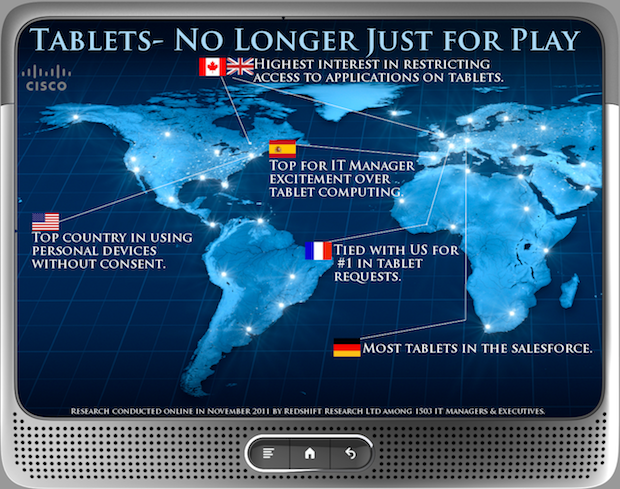Nearly half of IT managers against BYOD

Nearly half of IT managers and executives polled in six leading economies said that they would never let employees bring their own devices to work, according to Cisco.
Tablet computing in the enterprise world is about to hit a major turning point in 2012, but there are definitely some serious roadblocks ahead, according to a new report from Cisco.
The global survey found that IT departments are now getting one tablet request for every three smartphone requests. That could possibly be attributed the statistic that 48 per cent of companies surveyed said that they would never authorise employees to bring their own devices to work.
That's not good for proponents of the BYOD trend if nearly half of IT decision makers are still against the idea.
Of course, security is a serious and important concern here. But after citing lost and stolen devices as the number-one deterrent to this trend, 44 per cent of opponents said that handling BYOD issues diverts IT attention from other important projects.
Despite all of this, 57 per cent of IT managers acknowledged that some employees use personal devices at work without consent.

(Credit: Cisco)
For reference, the study results are based upon the responses from 1500 IT managers and executives in the United States, Canada, the United Kingdom, France, Germany and Spain on their attitudes, fears and hopes for mobile devices within the enterprise.
Yet, for the companies where employees are being given tablets by their IT departments, approvals differ based on country, and status within the country.
For example, 31 per cent of salespeople in Germany have tablets, while British counterparts are the least likely to get them at 14 per cent.
Likewise, senior executives are most likely to be issued a tablet in the United States at 38 per cent, but again, executives in the UK are the least likely, at 27 per cent.
Looking forward, IT managers in Spain appear to be the most excited about the integration of tablets in the workplace, with 90 per cent of respondents replying that they believe the tablet will become more popular in the next two years.